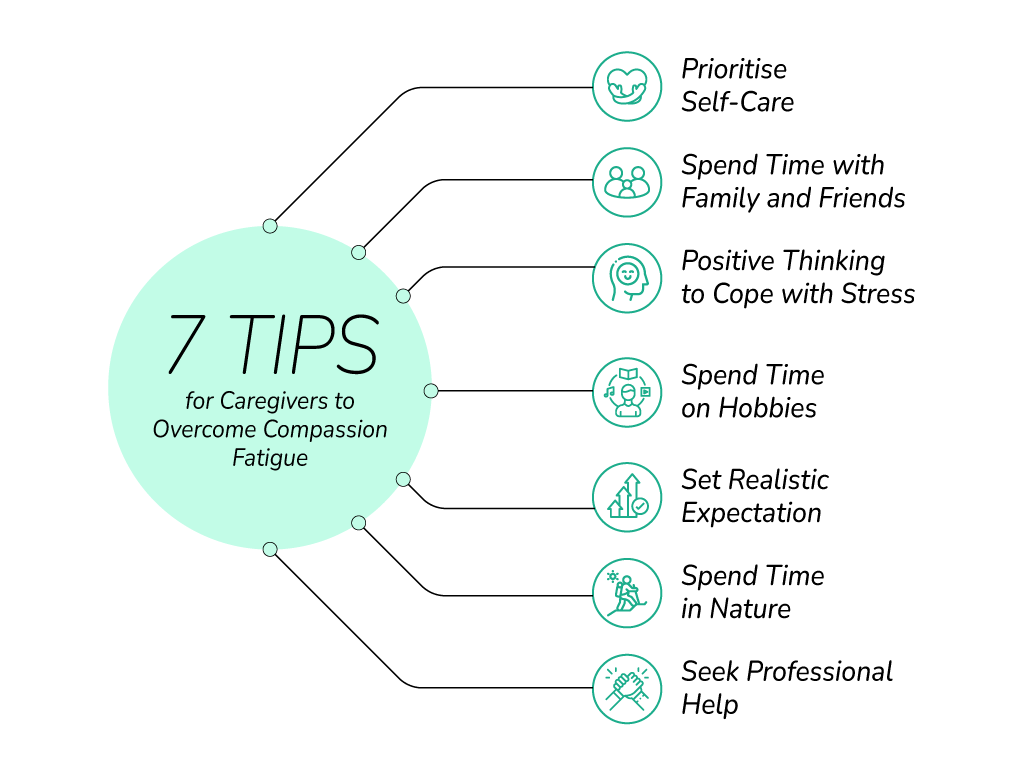Compassion fatigue can affect everyone, social workers, health professionals, or family members caring for a loved one. While working in health and social care provides an invaluable source of reward and fulfilment, it can have profound and sometimes life-changing effects on mental health. Compassion fatigue appears suddenly and unexpectedly, usually after prolonged exposure to stress and chronic exhaustion.
Here are the seven most effective ways to combat compassion fatigue.
Importance of Addressing Compassion Fatigue
Compassion fatigue poses a significant risk to people working in health and social care professions, and many report having experienced it to some extent. It’s unsurprising since people with high levels of empathy are often the most vulnerable to it.
Compassion fatigue entails both physical and emotional exhaustion, along with a significant decline in empathetic capacity. It develops as a form of secondary traumatic stress, stemming from the stress experienced by helping or desiring to help people in distress.
Often known as ‘the cost of caring’, untreated compassion fatigue can affect both mental and physical well-being. Furthermore, it can carry weighty ethical ramifications in therapeutic settings.
Although compassion fatigue is sometimes confused with burnout, they are distinct states of body and mind. While compassion fatigue is more manageable than burnout, it can manifest suddenly and unexpectedly, unlike burnout, which typically develops gradually over time.
Tips for Caregivers to Fight Compassion Fatigue
How does one practically go about managing their mental health, and what initial steps should be taken? We connected with several experts from our organisation, including coaches and team members, to explore the strategies they find most effective to use in tackling physical and emotional exhaustion.
The findings revealed a diverse range of approaches, with most people relying on a combination of routine practices for self-awareness and self-care. There’s no one-size-fits-all solution, and no single method serves as a universal solution for everyone’s mental well-being.
Here are seven ways to prevent compassion fatigue and nurture your emotional health.

Prioritise Self-Care
Self-care is the practice of prioritising one’s own well-being by attending to physical, emotional, and mental needs. It involves activities that promote relaxation, rejuvenation, and overall health. From simple acts like walking in nature or enjoying a warm bath to more structured routines such as meditation or exercise, self-care is essential for maintaining balance and resilience in daily life. By making time for self-care, individuals can better manage stress, boost their mood, and enhance their overall quality of life.
Here are a few self-care activities you can try:
- Take a long, leisurely bath with your favourite bath salts or essential oils
- Go for a walk in nature and soak in the beauty around you
- Set aside time to enjoy a hobby you love, whether it’s painting, gardening, or playing an instrument
- Schedule a coffee date or movie night with a friend to catch up and relax
- Find a good book and get lost in a captivating story for a few hours
- Practice deep breathing or meditation to calm your mind and reduce stress
- Listen to your favourite music or playlist
- Write down three things you’re grateful for each day to nurture a positive mindset
If you still feel overwhelmed, it’s best to consult a mental health professional to help you combat compassion fatigue.
Spend Time with Family and Friends
Spending quality time with family and friends can be a powerful strategy for combating compassion fatigue. Engaging in meaningful interactions with loved ones provides an opportunity to connect, relax, and find support outside work. Whether it’s sharing laughter over a meal, enjoying a walk together, or simply having a heartfelt conversation, these moments can offer a much-needed break from the demands of caregiving.
Building and nurturing strong relationships can also serve as a source of encouragement and inspiration, helping people to recharge and replenish their emotional reserves. By prioritising time with family and friends, those experiencing compassion fatigue can find comfort, strength, and renewed purpose in the company of those who care for them.

Positive Thinking to Cope with Stress
Positive thinking is a powerful tool for coping with stress. By focusing on the bright side of situations and maintaining an optimistic outlook, you can effectively reduce feelings of anxiety and improve mental and physical health. Instead of dwelling on problems, try reframing them as opportunities for growth or learning. Practice gratitude by acknowledging the good things in your life, no matter how small, and celebrate your achievements along the way. Cultivating a positive mindset can help you approach challenges with resilience and optimism, ultimately leading to greater overall well-being.
Spend Time on Hobbies
Investing time in hobbies is a valuable strategy for maintaining mental well-being. Whether it’s painting, gardening, cooking, or playing an instrument, hobbies provide an opportunity to unwind, express creativity, and immerse oneself in activities that bring joy. Engaging in hobbies allows for a break from the stresses of everyday life, promoting relaxation and rejuvenation. Additionally, pursuing interests outside work or responsibilities can foster a sense of fulfilment and balance. Making time for hobbies is not only enjoyable but also essential for cultivating a healthy lifestyle and enhancing overall happiness.
Set Realistic Expectation
In the battle against compassion fatigue, setting realistic expectations is a crucial strategy. While it’s natural to want to help as much as possible, it’s essential to recognise our limitations and understand that we cannot solve every problem or alleviate every suffering we face. Setting realistic expectations means accepting that we are only human and cannot do it all.
By setting achievable goals and boundaries, we can prevent burnout and preserve our energy for the long haul. It’s about finding a balance between caring for others and caring for ourselves. This might mean prioritising tasks, learning to say no when necessary, and delegating responsibilities when feasible.
Moreover, setting realistic expectations involves acknowledging that progress may be slow and that setbacks are inevitable. Embracing this reality allows us to approach our work with patience and resilience, understanding that change takes time and effort.
Ultimately, setting realistic expectations empowers us to make a meaningful difference while also safeguarding our well-being. It’s a reminder that we are doing our best and that it’s okay to take a step back and recharge when needed. By setting boundaries and managing our expectations, we can combat compassion fatigue and continue to make a positive impact.
Spend Time in Nature
Spending time in nature can be a powerful tool to prevent compassion fatigue, offering a much-needed respite from the demands of caregiving. Immersing oneself in the natural world provides an opportunity to disconnect from the stressors of daily life and reconnect with the beauty and tranquillity of the outdoors.
Whether it’s a leisurely hike through the forest, a peaceful stroll along the beach, or simply sitting beneath a tree in the park, nature has a way of calming the mind and soothing the soul. The sights, sounds, and scents of the natural world have been shown to reduce stress, lower blood pressure, and improve overall mood.
Moreover, spending time in nature encourages mindfulness, allowing us to be fully present in the moment and appreciate the simple pleasures that surround us. It provides a sense of perspective, reminding us of the vastness and beauty of the world beyond our immediate concerns.
Incorporating regular outdoor activities into our routine can help prevent burnout and replenish our reserves of compassion and empathy. By taking the time to reconnect with nature, we can rejuvenate our spirits, restore our sense of balance, and emerge refreshed and re-energised to continue our work of caring for others.
Seek Professional Help
Seeking professional help is a crucial step in combating compassion fatigue and safeguarding one’s mental and emotional well-being. While good self-care practices and support from loved ones are invaluable, there are times when professional guidance is necessary to address the complex and overwhelming feelings associated with caregiving.
A trained therapist or mental health professional can provide a safe and non-judgmental space to explore these emotions, learn mental self-care tips, and gain insight into the underlying causes of compassion fatigue. Through therapy, people can learn to set boundaries, manage stress more effectively, and cultivate resilience in the face of adversity.
Seeking professional help is not a sign of weakness but rather a proactive step towards emotional self-care and healing. It is an investment in one’s own health and capacity to continue making a positive difference in the lives of others.
LD Network Puts Caregivers First
LD Network is committed to prioritising the well-being of caregivers. Understanding the immense challenges and responsibilities that come with caregiving, we recognise the importance of providing support and resources to people who dedicate themselves to caring for others.
Our mission is to create a supportive community where caregivers can connect, share experiences, and access the assistance they need to navigate their caregiving journey with resilience and compassion. By putting caregivers first, we aim to empower them to maintain their own health and well-being while providing the best possible care.
As part of a people-centric organisation, LD Network goes above and beyond to support the mental and physical self-care of our clinicians.
Contact us today to access urgent and reliable staffing solutions that truly understand and meet the demands of the dynamic healthcare industry. Let LD Network be the bridge to your staffing needs, ensuring quality of care for the people you support and a flexible integration into your healthcare team.











